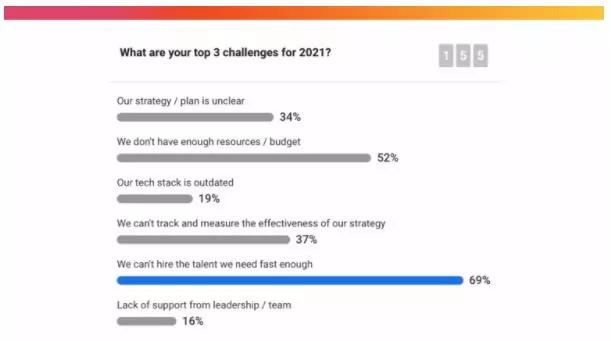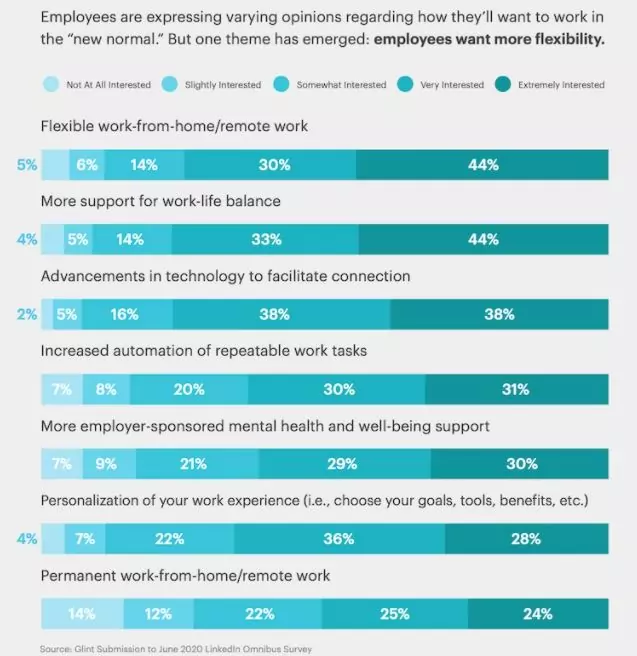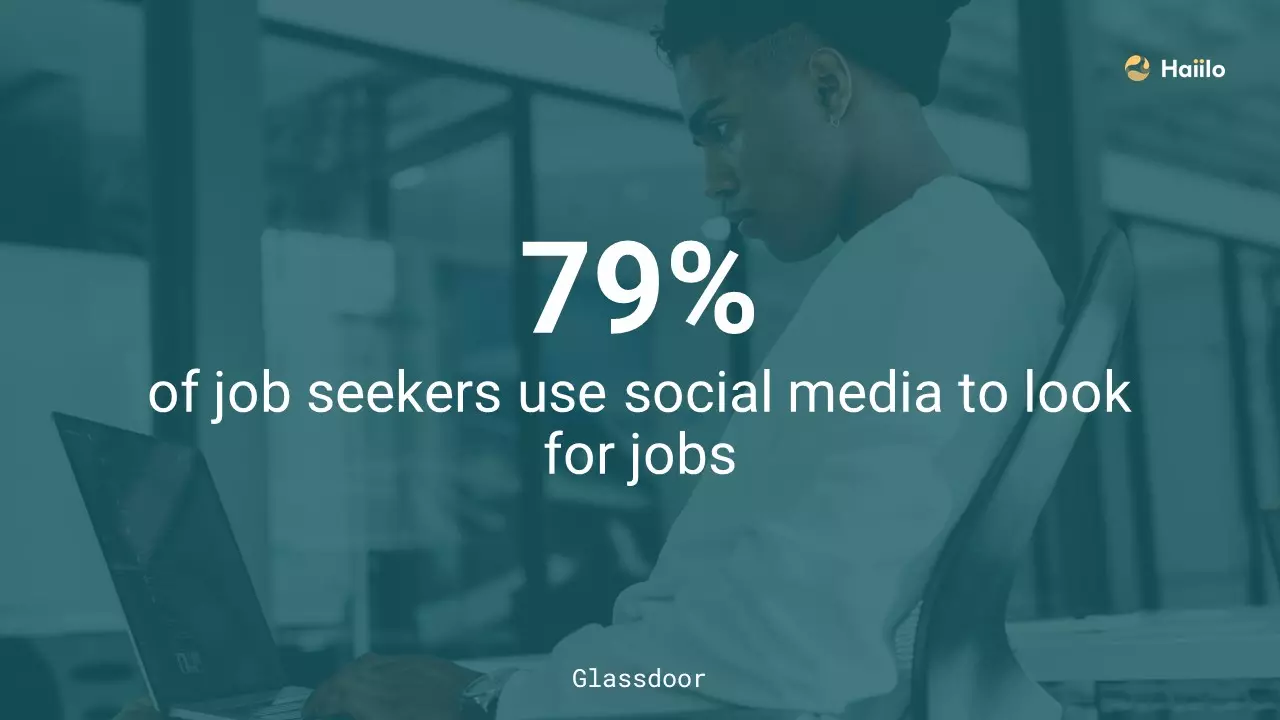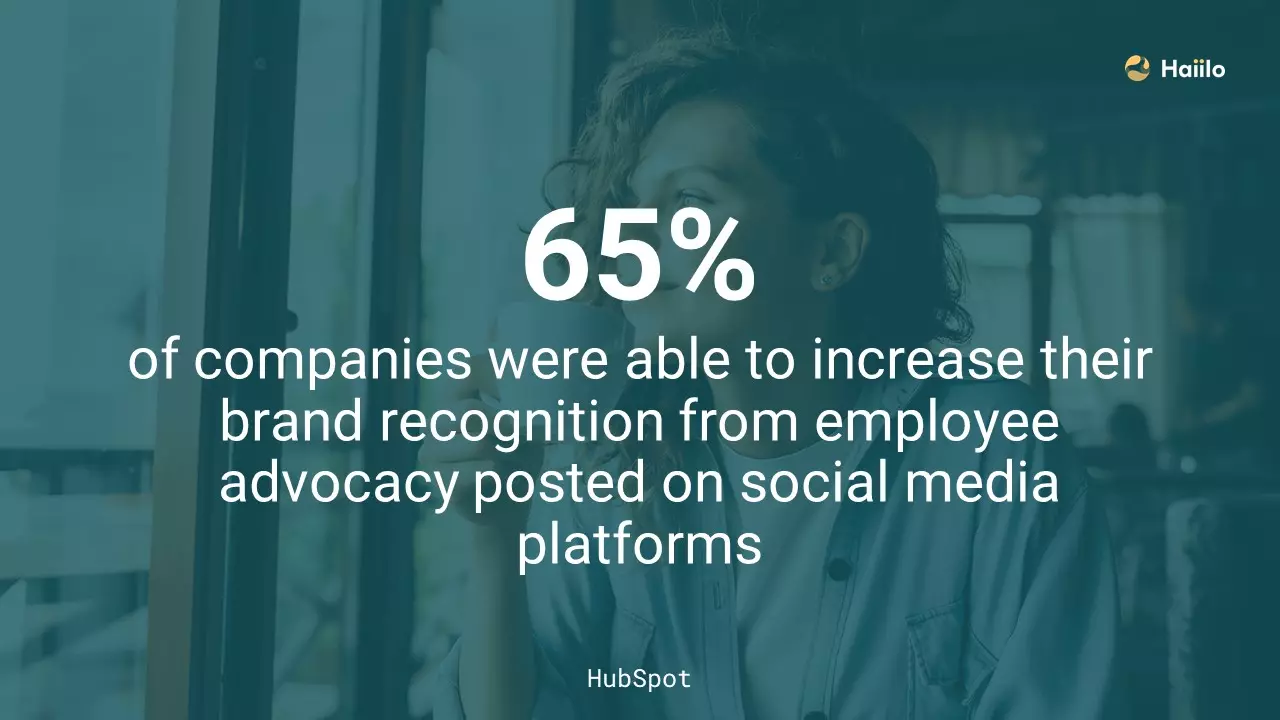Recruitment marketing has never been more important. Talent acquisition professionals across the world are faced with new talent attraction and talent retention challenges. This is particularly true for tech talent that can now work from anywhere in the world.
In this blog, we will talk about the increasing importance of recruitment marketing since the start of the pandemic, how this situation impacts talent acquisition efforts, and how to make recruitment marketing strategies more successful.
The Increasing Importance of Recruitment Marketing
The “Great Resignation” is no joke.
A global survey of 30,000 workers by Microsoft found that 41% were considering quitting or changing professions this year. Another study in the UK and Ireland showed 38% planned to quit. In the US, more than four million people quit their jobs in April alone.

Furthermore, Gallup found that 48% of employees are actively searching for new opportunities. And Persio reported that 38% of those they surveyed planned to make a change in the next six months.
Even before this pandemic, the war for talent was intense. Today, however, the situation is even worse as employers need to learn how to adapt to the new world situation.
They need to better understand the new benefits employees expect, and they need to adopt different recruitment marketing and talent acquisition tactics.
Since many organizations have started adopting remote working, most of today’s tech talent can work from anywhere in the world for a company of their choice.
Geographical boundaries have just disappeared.
Recruitment marketing plays a crucial role in defining your organization’s EVP, creating a comprehensive talent attraction strategy, and reaching the best talent out there.
Let’s take a look into how to implement and manage a successful recruitment marketing strategy.
How to Implement a Successful Recruitment Marketing Strategy
Recruitment is one of the biggest challenges HR professionals face today. Recruitment marketing is, hence, one of their main priorities.

Let’s take a look into some must-follow steps for implementing a recruitment marketing strategy that works.
Appoint the owners of your recruitment marketing initiatives
Even though recruitment marketing is not a new thing anymore, many organizations still don’t have designated recruitment marketing and employer branding owners.
This is particularly true for smaller organizations with fewer employees employed in their HR teams.
Here, it is important to understand that there is no single stakeholder that should do recruitment marketing. Moreover, HR, marketing, internal communications, CEOs, leaders, and employees all play a very important role in making recruitment marketing work.
Still, defining the owner is crucial. Knowing who is responsible for the delivery of recruitment marketing initiatives and campaigns can help you streamline your efforts and see better end results.
Rethink your EVP
If you haven’t updated your EVP since 2019, you should probably rethink it now. What talent wants today is very different compared to the pre-pandemic era.
A July 2021 Fast Company piece declared “The Era of Wacky Office Perks is Dead.” Employees are smart enough to recognize that games, toys, and mini-fridges full of energy drinks are not a substitute for leaders who truly care about them.
Employees want greater flexibility, autonomy, work-life balance, transparency and they want leaders who can trust them even when they are working from home.
The graph below is a great representation of what employees expect from their employers today.

More than anything, employees want to be recognized. According to Bonusly, 63% of workers who said they are regularly recognized also said they are very unlikely to look for a new job. Furthermore, people want to work for organizations that understand that hybrid work requires management to communicate more, not less.
They want to work on interesting projects, understand how they contribute to the overall success, and they want their employers to invest in employee wellbeing and career development
EVP is something that your company stands for, but that doesn’t mean that it should never be changed. Remote and hybrid work have changed the nature of work significantly, and so should your employee value proposition if you want to attract talent to your organization.
The best way to better understand what people want from their jobs today is to ask your own workforce.
To start, you can simply send them a survey asking them to compare their expectations before and after this pandemic.
💡 Related: Who Is Responsible for Defining the Employee Value Proposition (EVP) in the Workplace?
Understand and define your candidate persona
Candidate personas are also not a new thing in recruitment marketing. However, defining them today is not as easy as it may be in the past. Organizations in many countries today can’t compete with salaries that some other countries can offer to remote workers.
That being said, many employers are now looking for talent that lives in countries where they can offer better benefits and working conditions.
International hiring requires understanding different cultures, talent expectations, and differences in the ways candidates search for new job opportunities.
Even though this shift towards remote work makes building a diverse workforce much easier, it also takes a lot of adjustments in talent attraction and talent retention strategies.
Choose the right recruitment channels
One of the most important steps of every recruitment marketing strategy is understanding different recruitment channels and defining which channels bring you the best candidates.
In order to achieve this, the previous step is crucial.
While some recruitment channels work for frontline workers, they may not work for corporate employees.
Furthermore, while in some countries TA channels such as LinkedIn may be the best option, in some countries LinkedIn may not be as popular.
Traditionally, job boards were the most popular channel for recruiting new talent. Today, however, this channel seems to be one of the least efficient ones. Instead, employers tend to focus more on social media recruitment, niche job portals, headhunting, and employee referrals.
With 79% of job applicants using social media in their job search, it is inevitable that social media is one of the best recruitment channels every organization should leverage.

Provide the best candidate experience
Candidates are well aware of the current world situation. They know that the demand for talent is greater than ever. Because of that, they expect more from the hiring and selection processes.
The same way HR professionals aim to improve employee experience in the workplace, they should also strive towards ensuring better candidate experience.
Providing memorable candidate experience is one of the most important aspects of every recruitment marketing strategy. Ensuring seamless and fast application processes, timely post-interview feedback, clear reasons for rejections, and continuous candidate relationship management all have a big impact on shaping a positive candidate experience.
Unhappy candidates are much louder than those happy ones. They share their negative experiences via online and offline channels which can significantly hurt your employer brand and ability to attract new talent to your organization.
📚 Related: 11 Ways to Attract and Retain Millennials in the Workplace.
Engage your own employees
Good employer branding and recruitment marketing are impossible without your own employees, and there are many different ways to involve them in your recruitment marketing initiatives.
Firstly, they can be the best source of information you can use to define your candidate personas and EVPs. Just send them occasional surveys to get as much feedback as possible.
Also, employee-generated content is the only type of content that works in recruitment marketing. Employee testimonials and stories about their working experiences are what candidates care about. They don’t care nearly as much about what corporate offices and CEOs have to say compared to what employees have to say.
Besides contributing to content creation, having your employees share your employer branding and recruitment marketing content is crucial for talent attraction. The more employee advocates you have, the better the reach and the more high-quality job applicants.
Furthermore, employee referrals are still the best source of new hires. For that, you need to have your employees on your side. You need to motivate them to get involved, and you need to make this process as easy for them as possible.
Boost Your Recruitment Marketing Efforts With Employee Advocacy
From the previous section, you have hopefully realized the benefits of engaging your own employees in your recruitment marketing initiatives. Without employees’ motivation to share your company’s stories and job openings, recruitment marketing can never be as successful.
Your employees are your best storytellers, and they know how to communicate your core company values to the outside world. But you need to enable them to easily advocate and use their networks to bring new people in.
They should never have to spend time searching for employer branding content to share on social media channels. Instead, modern employee advocacy solutions have great features that help employees share optimal content at optimal times via the right social networks.
In order to motivate your employees to engage in your employer branding initiatives, you could create an advocacy program. One research proves that 65% of companies were able to increase their brand recognition from employee advocacy posted on social media platforms.

Remember that employees who are proud to work for your organization will be happy to share their voice with the external audience.
However, many employers not only don’t have a way to make it easy for employees to participate by sharing the company’s content externally, but they also don’t have a way to track and measure their employees’ efforts and initiatives.
Ideally, you should implement an employee advocacy solution that serves as a central place for employees to upload and share your recruitment marketing content, and also track your employees’ engagement in the advocacy program.
Schedule a Haiilo demo today to learn about how employee advocacy can help you improve your recruitment marketing efforts.









